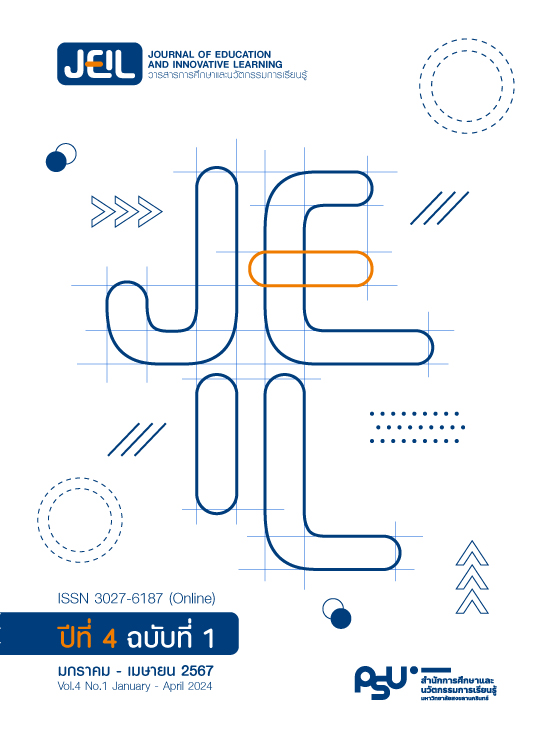การพัฒนาระบบบริหารจัดการเรียนรู้แบบผสมผสานวิชาสัมมนาแนวโน้มของการแก้ไขปัญหาในระบบการศึกษาโดยใช้เทคนิคห้องเรียนกลับด้านสำหรับผู้เรียนระดับบัณฑิตศึกษา
Main Article Content
บทคัดย่อ
วัตถุประสงค์ของการวิจัยครั้งนี้ 1) เพื่อสร้างและประเมินประสิทธิภาพของระบบบริหารจัดการเรียนรู้แบบผสมผสานสำหรับผู้เรียนระดับบัณฑิตศึกษาตามเกณฑ์ 80/80 2) เพื่อหาค่าดัชนีประสิทธิผลและผลสัมฤทธิ์ทางการเรียน และ 3) เพื่อศึกษาระดับความคิดเห็นของผู้เชี่ยวชาญและความพึงพอใจของผู้เรียนที่มีต่อการเรียนด้วยระบบที่พัฒนาขึ้น กลุ่มเป้าหมาย ได้แก่ นักศึกษาหลักสูตรศึกษาศาสตรมหาบัณฑิต ปีการศึกษา 2566 จำนวน 17 คน เครื่องมือที่ใช้ในการวิจัย คือ 1) ระบบบริหารจัดการเรียนรู้แบบผสมผสานโดยใช้เทคนิคห้องเรียนกลับด้าน 2) แบบทดสอบวัดผลสัมฤทธิ์ทางการเรียน 3) แบบสอบถามความคิดเห็นสำหรับผู้เชี่ยวชาญ และ 4) แบบสอบถามความพึงพอใจของผู้เรียน สถิติที่ใช้ในการวิเคราะห์ข้อมูลคือ ร้อยละ ค่าเฉลี่ย ส่วนเบี่ยงเบนมาตรฐาน และค่าสถิติทดสอบที ผลการวิจัยพบว่า ระบบที่พัฒนาขึ้นมีประสิทธิภาพ 81.97/83.04 ซึ่งสอดคล้องกับเกณฑ์ 80/80 และมีค่าดัชนีประสิทธิผลเท่ากับ .8235 ผู้เรียนที่เรียนด้วยระบบดังกล่าวมีผลสัมฤทธิ์ทางการเรียนหลังเรียนสูงกว่าก่อนเรียนโดยมีค่าสถิติทดสอบทีเท่ากับ 31.244 อย่างมีนัยสำคัญทางสถิติที่ระดับ .05 ผู้เชี่ยวชาญมีความคิดเห็นต่อคุณภาพของระบบในระดับมากและผู้เรียนมีความพึงพอใจกับระบบที่พัฒนาขึ้นอยู่ในระดับมากที่สุด ผลการวิจัยทำให้ได้ระบบที่มีประสิทธิภาพ สามารถนำไปใช้ในการเรียนการสอนได้จริง ทำให้ผู้เรียนในระดับบัณฑิตศึกษามีทักษะและพัฒนาการเรียนรู้วิชาสัมมนาแนวโน้มของการแก้ไขปัญหาในระบบการศึกษาได้ดียิ่งขึ้น
Article Details

อนุญาตภายใต้เงื่อนไข Creative Commons Attribution-NonCommercial-NoDerivatives 4.0 International License.
เนื้อหาและข้อมูลในบทความที่ตีพิมพ์ในวารสารการศึกษาและนวัตกรรมการเรียนรู้ ถือเป็นข้อคิดเห็นและความรับผิดชอบของผู้เขียน ซึ่งกองบรรณาธิการวารสาร ไม่จำเป็นต้องเห็นด้วยหรือร่วมรับผิดชอบใด ๆ และไม่สงวนสิทธิ์การคัดลอกบทความเพื่อใช้ประโยชน์ทางวิชาการ แต่ให้อ้างอิงข้อมูลแสดงที่มาของบทความทุกครั้งที่นำไปใช้ประโยชน์
เอกสารอ้างอิง
Azorín, C. (2020). Beyond covid-19 supernova. Is another education coming?. Journal of Professional Capital and Community, 5(3/4), 381-390. doi:10.1108/JPCC-05-2020-0019
Baytiyeh, H. (2017). The flipped classroom model: When technology enhances professional skills. The International Journal of Information and Learning Technology, 34(1), 51-62. doi:10.1108/IJILT-07-2016-0025
Chapman, C., & Bell, I. (2020). Building back better education systems: equity and covid-19. Journal of Professional Capital and Community, 5(3/4), 227-236. doi:10.1108/JPCC-07-2020-0055
Ismaili, Y. (2021). Evaluation of students’ attitude toward distance learning during the pandemic (Covid-19): a case study of ELTE University. On the Horizon, 29(1), 17-30. doi:10.1108/OTH-09-2020-0032
Kant, N., Prasad, K. D., & Anjali, K. (2021). Selecting an appropriate learning management system in open and distance learning: a strategic approach. Asian Association of Open Universities Journal, 16(1), 79-97. doi:10.1108/AAOUJ-09-2020-0075
Okolie, U. C., Elom, E. N., Igwe, P. A., Binuomote, M. O., Nwajiuba, C. A., & Igu, N.C.N. (2021). Improving graduate outcomes: Implementation of problem-based learning in TVET systems of Nigerian higher education. Higher Education, Skills and Work-Based Learning, 11(1), 92-110. doi:10.1108/HESWBL-12-2018-0140
Parramore, S. (2019). Online active-learning: information literacy instruction for graduate students. Reference Services Review, 47(4), 476-486. doi:10.1108/RSR-03-2019-0022
Phakamach, P., Senarith, P., & Wachirawongpaisarn, S. (2022). The metaverse in education: the future of immersive teaching & learning. RICE Journal of Creative Entrepreneurship and Management, 3(2), 75-88. 10.14456/rjcm.2023.2
Phakamach, P., Wachirawongpaisarn, S., & Panjarattanakorn, D. (2021). Development of active learning management platform using constructivism on the topic of ICT system and innovation for educational administration at graduation level. Journal of Education and Innovative Learning, 1(3), 219-237. [in Thai]
Phangphol, P., Phakamach, P., & Chaisakulkiet, U. (2022). The development of online teaching-learning platforms on control of the operation of information system using flipped classroom approach combined with case-based learning for undergraduate students of the faculty of information technology. Sripatum Chonburi Journal, 18(4), 100-114. [in Thai]
Sinlarat, P. (2020). The path to excellence in Thai education. RICE Journal of Creative Entrepreneurship and Management, 1(2), 60-75. doi: 10.14456/rjcm.2023.2
Smith, K. D. (2021). Is it face time or structure and accountability that matter? Moving from a flipped to a flipped/hybrid classroom. Journal of Applied Research in Higher Education, 13(2), 609-621. doi:10.1108/JARHE-08-2019-0229
Tam, S. (2022). Humor and learning styles: toward a deeper understanding of learning effectiveness in the virtual environment. Qualitative Research Journal, 22(2), 143-156. doi:10.1108/QRJ-04-2021-0041
Wachirawongpaisarn, S., Sangkaew, P., Soeykrathoke, P., & Phakamach, P. (2021). The development of a digital platforms on the topic of business economic using problem-based learning management model for vocational learners. Journal of Liberal Arts, Rajamangala University of Technology Suvarnabhumi, 3(3), 255-269. [in Thai]
Wongwuttiwat, J., Buraphadeja, V., & Tantontrakul, T. (2020). A case study of blended e-learning in Thailand. Interactive Technology and Smart Education, 17(2), 197-214. doi:10.1108/ITSE-10-2019-0068
Zainuddin, Z., Haruna, H., Li, X., Zhang, Y., & Chu, S. K. W. (2019). A systematic review of flipped classroom empirical evidence from different fields: what are the gaps and future trends?. On the Horizon, 27(2), 72-86. doi:10.1108/OTH-09-2018-0027


